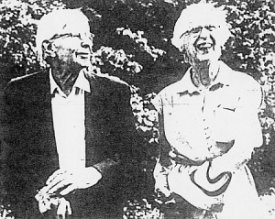GODDARD COLLEGE NAMES MAIN CAMPUS FOR FOUNDER
PLAINFIELD -- It was an experimental college in the 1930s, a cradle for student
power before it became fashionable in the 1960s.
Goddard College in Plainfield has long been considered the home of self-directed
education. Last week, the school paid homage to its founding president, Royce
"Tim" Pitkin, 84, by giving its main campus his name. It formally was known
as Greatwood Campus.
When Pitkin, a native of nearby Marshfield, and the few friends started the
college in 1938, they gave it a style and direction unusual, it's not unique,
then and since. Goddard's early faculty just about wrote the book on
self-directed education.
Pitkin and his wife, Helen, still live in Marshfield, on a hillside more than
two miles from a paved road and with a commanding view of the Winooski Valley.
Sometimes a dapper dresser, he walks with a black wooden cane to steady himself
when dizziness strikes him.
He occasionally returns to Goddard campus for a chat with current President
Jack Lindquist or old friends on the faculty, but more frequently Lindquist
seeks Pitkin out at home, he said.
In 1938, there were a few models of so-called "progressive education,"
including Vermont's Bennington College, but Goddard advanced the state of
the art and kept doing so.
The seven or so founders conjured the college nearly out of thin air on an
estate purchased for the Depression-era bargain price of $40,000, he said.
Pitkin taught American history the first year, and his wife taught home management.
"We felt we could teach almost anything, even though we didn't know much
about it," he said.
Among the principles Goddard was built upon was that the student was the boss
about curriculum.
"We decided an educational program should be designed by the student, that
the student should determine what kind of work he was going to do," Pitkin
said. "We went on the presumption that the best way to design a student's
program was to build on his interests and hopes for the future."
Another principle was that no "letter grades" were to be used in evaluating
progress, and a third principle was that each student would be asked to work
about eight hours a week helping to maintain and run the college.
"The students would feel it was their college, because they could see all the
work they had done," Pitkin said.
At the campus dedication ceremony, several students expressed their pride in
the college and thanked the former president for his early leadership and inspiration.
"I'm a new student, sir," said Spencer Goldstein of Malborough Mass, a
middle-aged man working toward a master's degree in technical education at
Goddard even though he has a master's in business administration from another
school. "I can't thank you enough for founding this college, I've been
looking for a school like this all my life."
From the beginning, Goddard pioneered a variety of adult education degree
programs, conferences and seminars. Among the first was an annual labor-farm
conference, which brought together the then-sparing groups of trade unionists
and farmers.
In those days, there weren't very cordial relations between those," Pitkin said.
"Well, they got together and found out the others weren't such bad guys."
Another early conference brought conservationists to the campus and resulted
eventually in the creation of the Vermont Natural Resources Council, an
influential Statehouse lobbying group today.
There was a weeklong school for young farmers. "Bringing those young people
together gave them some confidence they didn't have before, and some went on
to become leaders," Pitkin said.
A summer music school without teachers amounted to a continuous practice and
experimentation session. "You could hear them playing until after midnight
every day," he said.
Whatever happened at Goddard it was usually free-wheeling and fun, he
recalled "I always enjoyed it," Pitkin, who retired in 1969, said. "Money
didn't always roll in like we'd like, and you had to cope with that, but
the rest was a pleasure."
Lindquist credited Pitkin and the other college founders with having "set a
model for adult education in which you bring adults together to solve their
own problems rather than telling them how to solve their problems."
Pitkin, with modesty and humor reminiscent of that of his friend the late
George Aiken, once a Goddard trustee, said, "I'm a little worried because
many people have said I influenced them greatly. To think I'm responsible
for their behavior...."

Goddard College paid tribute to its founding president,
Royce Pitkin, last week by naming the main campus, formerly known as Greatwood
Campus, for him. Pitkin is shown with his wife Helen.

